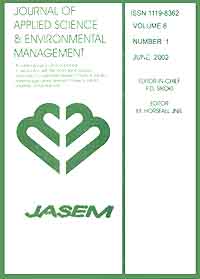
|
Journal of Applied Sciences and Environmental Management
World Bank assisted National Agricultural Research Project (NARP) - University of Port Harcourt
ISSN: 1119-8362
Vol. 23, No. 1, 2019, pp. 29-34
|
 Bioline Code: ja19004
Bioline Code: ja19004
Full paper language: English
Document type: Research Article
Document available free of charge
|
|
|
Journal of Applied Sciences and Environmental Management, Vol. 23, No. 1, 2019, pp. 29-34
| en |
Plasmid Curing in Multi-Drug Resistant Hospital and Community Uropathogenic Escherichia coli 
ONYEADI, DJ & AGBAGWA, OE
Abstract
Escherichia coli is the most prevalent organism responsible for urinary tract infections (UTIs) in
hospital and community sources. The present study was carried out to detect multi drug resistant (MDR) E coli from
urine samples and the role of plasmids in drug resistance. One hundred urine samples were collected from the
hospital and community within the University of Port Harcourt. Microscopic and chemical examination was carried
out on the urine samples. E coli were isolated and antibiotic sensitivity test was carried out on the isolates, the
resistant E. coli were cured by acridine orange and further subjected susceptibility testing. Result obtained from the
study showed 35% E. coli recovered from community samples and 65% from hospital samples. Antibiotic
sensitivity testing before plasmid curing showed high level of resistance to Augmentin (99%), Cefuroxime (92%),
Ceftazidime (78%) and Cefixime (71%). The lowest level of resistance was reported in Gentamicin (15%) and
Nitrofurantoin (19%). All the isolates were resistant to Augmentin but upon plasmid curing the resistant rate of
isolates to eight antibiotics reduced. Our findings showed that Augmentin and Cefuroxime (62 and 31%) were still
resistant after the plasmids of the isolates were cured. For hospital and community sources Nitrofurantoin (1; 0%),
Ceftazidime (3; 8%), Ciprofloxacin (1%), Gentamicin (10%) and Ofloxacin (10%). Sixty-two (62) percent of the
hospital isolates were resistant to three or more antibiotics while 60% of the community isolates were multidrug
resistant. Our study thus concludes that plasmids alone are not responsible for the resistance to antibiotics exhibited
by E,coli from urine samples. Antibiotics should be produced to target genes that are responsible for resistance to
prevent the spread of drug resistant organisms.
Keywords
Antibiotics; Escherichia coli; Multidrug resistant; Plasmid
|
| |
© Copyright 2019 - Onyeade and Agbagwa
|
|
